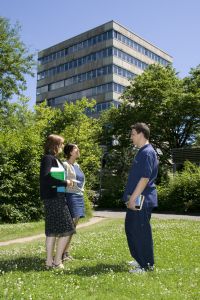Curriculum and Certificates
Photo taken from: stock.xchng, photographer: Arjun Kartha
National Curriculum
In 1992 the National Curriculum was introduced for all state schools, which they have to stick to until their pupils are 16. However, this does not apply to independent schools.
English, Mathematics and Science are the National Curriculum core subjects. Design and Technology, Information and Communication Technology, History, Geography, Modern Foreign Languages, Music, Art and Design, Physical Education, Religious Education and Citizenship are so-called foundation subjects. In Northern Ireland it is also possible for schools to establish an additional curriculum to adjust to the pupils' individual needs and situations. In Wales Welsh is an additional core subject as is Irish in Northern Ireland.
In 1992 the National Curriculum was introduced for all state schools, which they have to stick to until their pupils are 16. However, this does not apply to independent schools.
English, Mathematics and Science are the National Curriculum core subjects. Design and Technology, Information and Communication Technology, History, Geography, Modern Foreign Languages, Music, Art and Design, Physical Education, Religious Education and Citizenship are so-called foundation subjects. In Northern Ireland it is also possible for schools to establish an additional curriculum to adjust to the pupils' individual needs and situations. In Wales Welsh is an additional core subject as is Irish in Northern Ireland.
Key Stages
The British Educational System is organised into 4 Key Stages embracing the full-time compulsory school education for children and young people. The Sixth Form covers the two additional years of Secondary Education leading up to A-Level.
Primary Education:
Key Stage 1: Year 1 and 2, age 5 to 7
Key Stage 2: Year 3 - 6, age 7 to 11
Secondary Education:
Key Stage 3: Year 7 - 9, age 11 to 14
Key Stage 4: Year 10 and 11, age 14 to 16
Sixth Form: Year 12 and 13, age 16 to 18
Each Key Stage ends with a test or an exam, i.e. National Curriculum Tests, GCSE, A-Level.
The British Educational System is organised into 4 Key Stages embracing the full-time compulsory school education for children and young people. The Sixth Form covers the two additional years of Secondary Education leading up to A-Level.
Primary Education:
Key Stage 1: Year 1 and 2, age 5 to 7
Key Stage 2: Year 3 - 6, age 7 to 11
Secondary Education:
Key Stage 3: Year 7 - 9, age 11 to 14
Key Stage 4: Year 10 and 11, age 14 to 16
Sixth Form: Year 12 and 13, age 16 to 18
Each Key Stage ends with a test or an exam, i.e. National Curriculum Tests, GCSE, A-Level.
Certificates of Education
The Educational System of England, Wales and Northern Ireland emphasises the depth of education and knowledge, whereas the Scottish Educational System values the breadth of education. This means that English pupils usually sit less but more advanced exames, whereas Scottish pupils sit more but less advanced exams.
At the end of Year 11 and after five years of Secondary Education the pupils take their GCSE (General Certificate of Education) exams in up to ten subjects. The exams are set and marked by independent exam boards chosen by the schools.
The Educational System of England, Wales and Northern Ireland emphasises the depth of education and knowledge, whereas the Scottish Educational System values the breadth of education. This means that English pupils usually sit less but more advanced exames, whereas Scottish pupils sit more but less advanced exams.
At the end of Year 11 and after five years of Secondary Education the pupils take their GCSE (General Certificate of Education) exams in up to ten subjects. The exams are set and marked by independent exam boards chosen by the schools.
Photo taken from: stock.xchng, photographer: Alexander Sperl
After their GCSE exams pupils may leave school to start working or attend a vocational or technical college. They could also stay at school and continue their Secondary Education leading up to A-Level. After one year of study they could take their AS-Level exams and after two years of study their A-Level (Advanced Level) exams. Pupils usually take A-Level exams in up to four subjects. The A-Level is the requirement for entering a university in the UK.
A slightly different system applies in Scotland. After attending 7 years of Primary and 4 years of Secondary Education pupils at the age of 15/16 take their Standard Grade or Intermediate Exam, which is the equivalent to the English GCSE. They sit these exams for usually about 8 subjects with compuslory exams in English, Mathematics and a Science subject. After another two years, which are comparable to the English Sixth Form, they take their Higher Grade and Advanced Higher exams, which are equivalent to the English A-Level and the requirement for attending university.


